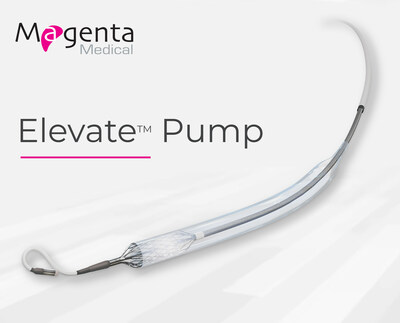The US Early Feasibility Study of Magenta Medical’s Elevate™ System, designed to provide temporary mechanical circulatory support during high-risk percutaneous coronary intervention (HR-PCI) procedures, has successfully met its objectives.
| |
| [26-October-2023] |
| Results presented at TCT 2023 in San Francisco KADIMA, Israel and SAN FRANCISCO, Oct. 26, 2023 /PRNewswire/ -- The US Early Feasibility Study of Magenta Medical’s Elevate™ System, designed to provide temporary mechanical circulatory support during high-risk percutaneous coronary intervention (HR-PCI) procedures, has successfully met its objectives. Elevate™ is the smallest and most powerful percutaneous Left Ventricular Assist Device (pLVAD) in the world. The results were presented by Dr. Perwaiz M. Meraj, Director of the Cardiac Catheterization Laboratory at North Shore University Hospital (Northwell System), at the Transcatheter Cardiovascular Therapeutics (TCT) conference, the annual scientific symposium of the Cardiovascular Research Foundation in San Francisco. The presentation also included a case study of one of the patients enrolled in the trial. Mechanical circulatory support is often necessary for high-risk patients with coronary artery disease undergoing a catheterization procedure to open blockages in the arteries feeding the heart to improve quality of life and reduce the risk of heart attacks. Since the duration of support for this indication is relatively short (up to 6 hours), with patients ambulatory soon following the procedure, it is particularly important to limit the insertion profile of the device in order to minimize vascular access complications. Magenta Medical’s Elevate™ Pump addresses this unmet clinical need. STUDY RESULTS Fifteen patients were treated in the study at The Mount Sinai Hospital, St. Francis Hospital and Heart Center, and North Shore University Hospital. Investigators include Drs. Samin K. Sharma, Richard A. Shlofmitz, Ziad Ali, Allen Jeremias, Rajiv Jauhar, Perwaiz M. Meraj, Margaret B. McEntegart, and Ajay J. Kirtane. All 15 patients (mean age of 65) underwent a HR-PCI, with Left Ventricular Ejection Fraction (EF) of 35 ± 10% at baseline and 45 ± 11% at discharge. Key findings: Performance:
Technical Success:
Safety:
Usability:
Access Site and Closure:
CASE STUDY A 71-year-old male, with severe generalized atherosclerosis, an abdominal aortic aneurysm, 3-vessel coronary artery disease, and severely depressed left ventricular function, was referred to a HR-PCI procedure. With a pre-existing bi-fascicular block and a known prior episode of syncope, the patient developed complete AV-Block with ventricular asystole early in the procedure. Elevate™ Pump flow was increased (mean of 5.7-5.9 L/min), allowing placement of a trans-venous temporary pacemaker under stable hemodynamic conditions. As a result, mean arterial pressures were normal and stable throughout the procedure, the patient remained conscious and communicative for the duration, and the extensive revascularization plan (stenting, rotational atherectomy, and intravascular lithotripsy) was fully achieved in less than one hour. The complete AV-Block subsided upon arrival at the ICU, and the pacemaker lead was removed. About Elevate™ The Elevate™ percutaneous Left Ventricular Assist Device (pLVAD) is a miniaturized heart pump that fits an 8 Fr delivery system. The ElevateTM Pump can be inserted over a guidewire, using a 10 Fr commercially available femoral introducer sheath, providing the smallest crimping profile in the industry. The flow of the pump is adjusted based on the clinical circumstances of the patient and can exceed 5 L/min of mean flow. This makes it the most powerful device of its kind. Elevate™ is an investigational device, limited by federal law to investigational use only. The technology was awarded Breakthrough Device Designation from the US Food and Drug Administration (FDA) for two indications: high-risk percutaneous coronary intervention (HR-PCI) and cardiogenic shock. About Magenta Medical Magenta Medical Ltd. is a privately-held company dedicated to the development of miniaturized blood pumps intended to provide minimally-invasive support to the native heart during acute episodes of dysfunction that could lead to dangerously low blood pressure and compromised perfusion of vital organs. Magenta’s Elevate™ percutaneous Left Ventricular Assist Device (pLVAD) is currently in clinical trials to be evaluated for at least two indications: patients undergoing high-risk coronary interventions (HR-PCI) and patients with cardiogenic shock. For more information, please visit https://magentamed.com/ Media Contact Photo - https://mma.prnewswire.com/media/2257391/Magenta_Medical.jpg
SOURCE Magenta Medical |





